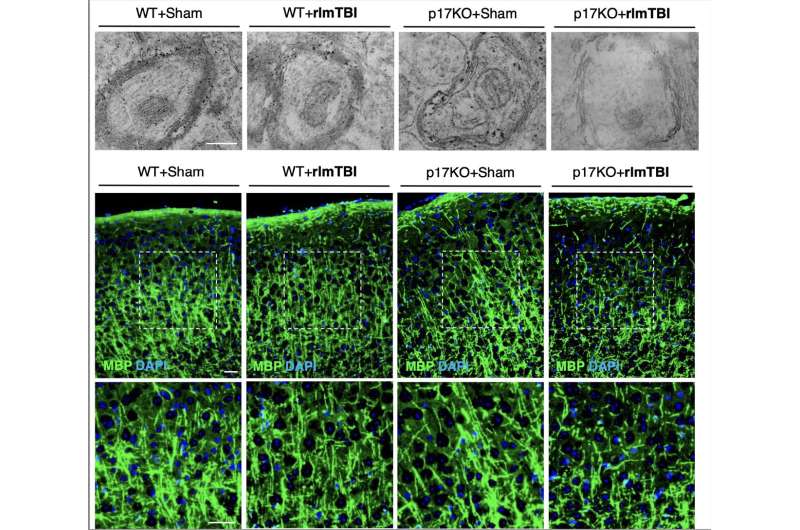This article has been reviewed according to Science X's editorial process and policies. Editors have highlighted the following attributes while ensuring the content's credibility:
fact-checked
peer-reviewed publication
proofread
Novel drug could protect brains from damage after repeat concussions

Repeat concussions, also referred to as repetitive mild traumatic brain injury, can lead to chronic traumatic encephalopathy (CTE) and raise the risk of Alzheimer's disease. However, some people who experience repetitive mild traumatic brain injury never develop major disease.
Onder Albayram and colleagues investigated the role of a protein known as p17 in protecting brains from long-term pathologies. In stressed neurons, p17 initiates production of C18-Ceramide, a bioactive sphingolipid that acts as a label of damaged mitochondria in neuronal axons. The study is published in the journal PNAS Nexus.
Labeled mitochondria are then detected and removed by autophagosomes. The authors knocked out p17 in mice. Some p17-knockout mice underwent a new experimental model of repetitive concussive brain injury, known as the repetitive less-than-mild closed head injury (rlmTBI) paradigm.
These mice developed significant sensorimotor deficits after three months. By six months, the mice had cognitive deficits. Control mice showed no behavioral impairments.
In the rlmTBI p17-knockout mice's brains, the authors found compromised and disarranged membranes in axonal mitochondria. In normal mice, these mitochondria would have been destroyed, but since that process was interrupted, the dysfunctional organelles persisted, and caused axonal degeneration, which in turn led to pathological outcomes.
The authors developed a mitochondrial targeted pyridinium-ceramide analog drug, LCL768, which accumulates in damaged mitochondria and restores the process by which these organelles are removed.
In mice, treatment with LCL768 prevented the development of secondary axonal degeneration and led to improved functional outcomes compared to mice who received a placebo.
Finally, the authors examined human tissue from six neuropathologically verified CTE cases with a history of repetitive traumatic brain injury. The CTE-positive samples exhibited less p17 expression and less mitochondrial C18-Ceramide than six age- and sex-matched healthy control samples.
According to the authors, drugs that ensure a healthy pool of axonal mitochondria in the brain could be candidates for use as prophylactic treatments after a concussion.
More information: Eda Karakaya et al, p17/C18-ceramide–mediated mitophagy is an endogenous neuroprotective response in preclinical and clinical brain injury, PNAS Nexus (2024). DOI: 10.1093/pnasnexus/pgae018





















